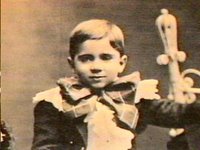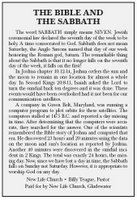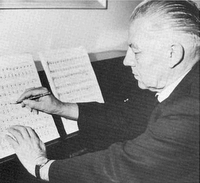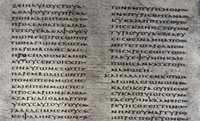
114 years ago tomorrow, July 31 1892, Herbert W. Armstrong was born in Des Moines. Not a man to encourage the celebration of birthdays, he nonetheless - unlike the children of his later followers - had the pleasure of receiving a 9th birthday party his mother organized, a photograph of which remained with the man-who-would-be-apostle throughout his life.
Like John Brown, Herb Armstrong's body lies a-mouldering in its grave. A man who built a religion and recruited his family into key positions (brother Dwight, son-in-law Vern Mattson, son Garner Ted), there remains only a shadow of the church he built and an absence of his descendants among its adherents.
Devotees of Armstrongism will scarcely mark this day, any more than they mark their own birth dates, but for those of us who've moved beyond his baneful influence (around 80% of the membership just over a decade ago) it's a chance to pause and consider the man, his motivations and his impact.
His impact on the world, or even the religious world was minimal. He barely makes the footnotes in reference works. But his impact in our lives was of another order.
As for his motivations, that's a complex question. Did he really believe what he preached? If not, how do you understand the attitude to medical intervention following his son Dick's fatal car crash? If he did, how do you explain his convenient rewriting of church doctrine to allow the marriage to divorcee Ramona? Perhaps he ended up convincing himself of his own fictions. As David Robinson observed, the web is so tangled it is almost impossible to peer beyond it.
While it is certain that Herbert Armstrong's body lies a-mouldering in the grave, it's less certain that his soul goes marching on. Perhaps its appropriate that for each one of his imitators in 2006, the followers of Pack, Meredith, Flurry and a gaggle of other wannabes, there are so many more who have reintegrated into a life unconnected with Herbert's grandiose vision.
And that, I think, is a cause for optimism.










